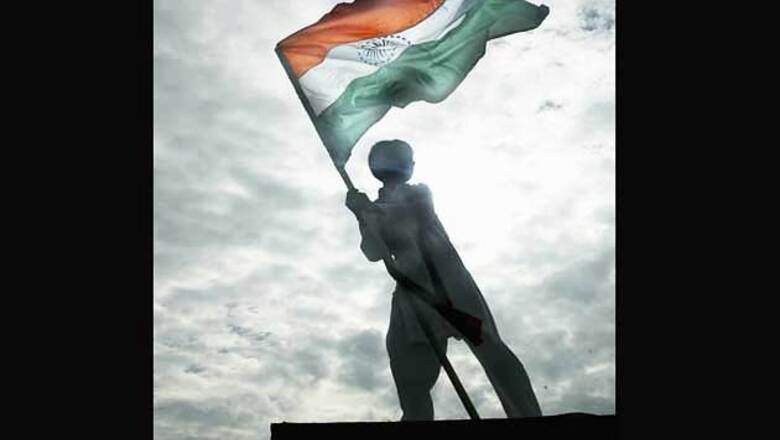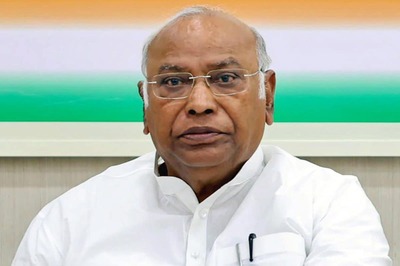
views
As citizens of India, we all have certain duties, rights and so does the government that governs us. It is all enshrined in the Constitution of India, a document with which our relationship is remote if not virtually non-existent. Many of us study it in a mechanical way in the high school and college years but the contents rarely sink in.
"Read the Constitution of India with IBNLive" seeks to bring us close to the Constitution that governs us. The Indian Constitution is a living and dynamic document and we, the people of India, need to be aware of our rights and duties as citizens and to hold the government that we elect to its responsibility as enshrined in the Constitution.
It is precisely because the Indian Constitution is a social contract between the government and the people governed i.e. us Indians, it is important to know what we can do, what we can't do and what are our rights. It is also fundamentally important to know what the government can do and what it can't do, specially when cartoonists are being targeted for their art and parties are trying their best to push such bills through which will curb the power of the mass media as well as social media.
Beginning today, over the next few weeks, we will run the Constitution of India in parts. We start with the PREAMBLE, PART-I and II. So read it yourselves, invite your friends to read it, share it on your walls and feeds so that more and more Indians get involved with the process.
Renowned constitutional expert Dr Subhash C Kashyap will join us for a chat at 2 pm on Wednesday (May 16, 2012) to answer the queries and doubts which may arise after reading the parts of the Constitution mentioned above. You can post your questions here. Dr Kashyap will be with us when we read the other parts of the Constitution too.
Hope you find this endeavour meaningful. Read on.
THE CONSTITUTION OF INDIA
PREAMBLE
WE, THE PEOPLE OF INDIA, having solemnly resolved to constitute India into a SOVEREIGN SOCIALIST SECULAR DEMOCRATIC REPUBLIC and to secure to all its citizens:
JUSTICE, social, economic and political;
LIBERTY of thought, expression, belief, faith and worship;
EQUALITY of status and of opportunity;
and to promote among them all
FRATERNITY assuring the dignity of the individual and the unity and integrity of the Nation;
IN OUR CONSTITUENT ASSEMBLY this twenty-sixth day of November, 1949, do HEREBY ADOPT, ENACT AND GIVE TO OURSELVES THIS CONSTITUTION.
PART I
THE UNION AND ITS TERRITORY
1. Name and territory of the Union.—(1) India, that is Bharat, shall be a Union of States.
(2) The States and the territories thereof shall be as specified in the First Schedule.
(3) The territory of India shall comprise—
(a) the territories of the States;
(b) the Union territories specified in the First Schedule; and
(c) such other territories as may be acquired.
2. Admission or establishment of new States.—Parliament may by law admit into the Union, or establish, new States on such terms and conditions as it thinks fit.
2A. [Sikkim to be associated with the Union.] Rep. by the Constitution (Thirty- sixth Amendment) Act, 1975, s. 5 (w.e.f. 26-4-1975).
3. Formation of new States and alteration of areas, boundaries or names of existing States.—Parliament may by law—
(a)form a new State by separation of territory from any State or by uniting two or more States or parts of States or by uniting any territory to a part of any State;
(b) increase the area of any State;
(c) diminish the area of any State;
(d) alter the boundaries of any State;
(e) alter the name of any State:
Provided that no Bill for the purpose shall be introduced in either House of Parliament except on the recommendation of the President and unless, where the proposal contained in the Bill affects the area, boundaries or name of any of the States, the Bill has been referred by the President to the Legislature of that State for expressing its views thereon within such period as may be specified in the reference or within such further period as the President may allow and the period so specified or allowed has expired.
Explanation I.—In this article, in clauses (a) to (e), "State" includes a Union territory, but in the proviso, "State" does not include a Union territory.
Explanation II.—The power conferred on Parliament by clause (a) includes the power to form a new State or Union territory by uniting a part of any State or Union territory to any other State or Union territory.
4. Laws made under articles 2 and 3 to provide for the amendment of the First and the Fourth Schedules and supplemental, incidental and consequential matters.—
(1) Any law referred to in article 2 or article 3 shall contain such provisions for the amendment of the First Schedule and the Fourth Schedule as may be necessary to give effect to the provisions of the law and may also contain such supplemental, incidental and consequential provisions (including provisions as to representation in Parliament and in the Legislature or Legislatures of the State or States affected by such law) as Parliament may deem necessary.
(2) No such law as aforesaid shall be deemed to be an amendment of this Constitution for the purposes of article 368.
PART II
CITIZENSHIP
5. Citizenship at the commencement of the Constitution.—At the commencement of this Constitution, every person who has his domicile in the territory of India and—
(a) who was born in the territory of India; or
(b) either of whose parents was born in the territory of India; or
(c) who has been ordinarily resident in the territory of India for not less than five years immediately preceding such commencement,
shall be a citizen of India.
6. Rights of citizenship of certain persons who have migrated to India from Pakistan.—Notwithstanding anything in article 5, a person who has migrated to the territory of India from the territory now included in Pakistan shall be deemed to be a citizen of India at the commencement of this Constitution if—
(a) he or either of his parents or any of his grand-parents was born in India as defined in the Government of India Act, 1935 (as originally enacted); and
(b)(i) in the case where such person has so migrated before the nineteenth day of July, 1948, he has been ordinarily resident in the territory of India since the date of his migration, or
(ii) in the case where such person has so migrated on or after the nineteenth day of July, 1948, he has been registered as a citizen of India by an officer appointed in that behalf by the Government of the Dominion of India on an application made by him therefore to such officer before the commencement of this Constitution in the form and manner prescribed by that Government:
Provided that no person shall be so registered unless he has been resident in the territory of India for at least six months immediately preceding the date of his application.
7. Rights of citizeship of certain migrants to Pakistan.—Notwithstanding anything in articles 5 and 6, a person who has after the first day of March, 1947, migrated from the territory of India to the territory now included in Pakistan shall not be deemed to be a citizen of India:
Provided that nothing in this article shall apply to a person who, after having so migrated to the territory now included in Pakistan, has returned to the territory of India under a permit for resettlement or permanent return issued by or under the authority of any law and every such person shall for the purposes of clause (b) of article 6 be deemed to have migrated to the territory of India after the nineteenth day of July, 1948.
8. Rights of citizenship of certain persons of Indian origin residing outside India.—Notwithstanding anything in article 5, any person who or either of whose parents or any of whose grand-parents was born in India as defined in the Government of India Act, 1935 (as originally enacted), and who is ordinarily residing in any country outside India as so defined shall be deemed to be a citizen of India if he has been registered as a citizen of India by the diplomatic or consular representative of India in the country where he is for the time being residing on an application made by him therefor to such diplomatic or consular representative, whether before or after the commencement of this Constitution, in the form and manner prescribed by the Government of the Dominion of India or the Government of India.
9. Persons voluntarily acquiring citizenship of a foreign State not to be citizens.— No person shall be a citizen of India by virtue of article 5, or be deemed to be a citizen of India by virtue of article 6 or article 8, if he has voluntarily acquired the citizenship of any foreign State.
10. Continuance of the rights of citizenship.—Every person who is or is deemed to be a citizen of India under any of the foregoing provisions of this Part shall, subject to the provisions of any law that may be made by Parliament, continue to be such citizen.
11. Parliament to regulate the right of citizenship by law.—Nothing in the foregoing provisions of this Part shall derogate from the power of Parliament to make any provision with respect to the acquisition and termination of citizenship and all other matters relating to citizenship.




















Comments
0 comment